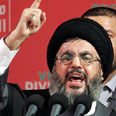
The Shiite movement and its followers have produced revolutionary anthems since its official creation in 1985, but the "victory" in its latest war with Israel has brought unprecedented sales and thrust its previously unknown performers onto the international circuit.
"We're selling 50 percent more Hizbullah music since the end of the war" on August 14, says studio owner and distributor Hassan Abu Jaafar from his base in Beirut's Shiite-dominated southern suburbs.
"We've put out 10 new titles since then, compared to only five from January to July."
Within days of the end of fighting, new CDs complete with images of Hizbullah's claimed victory and the destruction wrought by Israeli bombs were piling up in the shops.
Abu Jaafar says he sells almost half a million Hizbullah-themed CDs and cassettes a year but refers questions about his profits to the finance ministry where his taxes go, grumbling also that demand is so great much of his music is pirated.
Described by its performers as Hizbullah's other weapon, the stirring marshall rhythms feature baritone male voices chanting about resistance, Hizbullah and Islam against a background of drum rolls, synthesizer crescendos and the occasional bagpipe solo.
One CD – Kept Promise – is named after Hizbullah's July 12 cross-border capture of two Israeli troops that sparked the 34-day war, with song titles such as "Lebanon will survive," "America is a bloodsucker" and "Music of the Martyr."
The Al-Wilaya group of singers says it is "the official Hizbullah troupe," with the modern-day troubadours' spokesman Ali Kazan saying proudly that "the resistance is not just about weapons, but about words and chants. We have a message to bring through art."
'Proud to represent name of resistance'
Since the end of the war, the troupe has toured abroad in Kuwait and Bahrain -- a first for the men who have performed together since 1988.
"The people didn't look at us as only a Hizbullah troupe, in their eyes we were the incarnation of (Hizbullah leader Hassan) Nasrallah," says Kazan. "We are proud to represent the name of the resistance."
Describing their music as chanting rather than singing, Kazan says that Hizbullah fighters returning from the front told him that they used to fire off their lyrics at hidden Israeli troops.
"These chants are a means of spiritual motivation for the fighters, it's a different kind of weapon," says the jovial-looking Kazan, adding that while Arab pop music is about love between a man and a woman, his chants are about "a dialogue between God and man."
"We use drums, synthesizers, trumpets, clarinets, but not tambourines or derbakehs (a small underarm drum) because they evoke belly dancing. We don't want people to think about dancing, so if it looks like they might, we'll slow the music down."
"Of course I want our chants to be known but not everywhere or at any cost. For instance, I don't think they should be played in nightclubs."
Most of the performers are classically trained at the Beirut Conservatory, and Ghamlush says many songs are inspired by classical composers such as Russia's Pyotr Ilyich Tchaikovsky.
Manager Hassan Ghamlush says he has no objection to pop stars releasing their own patriotic songs, such as the latest offering by Julia Boutros -- a Christian -- complete with a video of her walking through the ruins of southern Lebanon as Hizbullah fighters emerge triumphantly from the woods.
"We don't compare ourselves to them, but we don't mind competition if it's for the same cause. A part of the population might not like what we do and prefer what Julia is doing."
Wearing a stylishly trimmed beard, Ghamlush accuses Western media of distorting the reality of Hizbullah.
"They think we are ignorant and backward but we are cultured. We love life, music and art, we don't just live for martyrdom and death. But we do want to live with dignity and pride."















